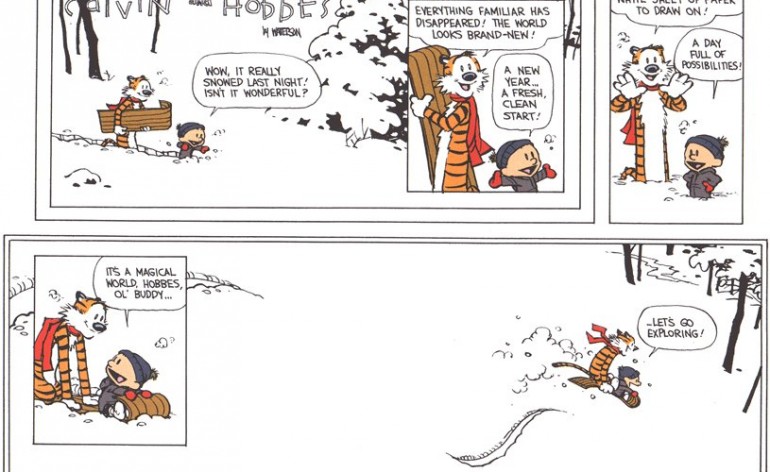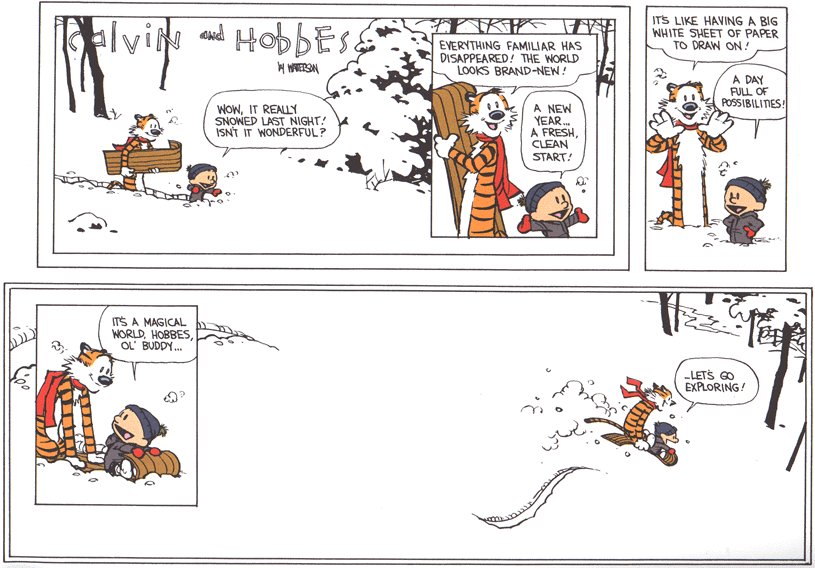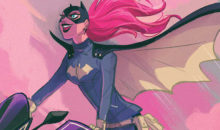An Interview with Bill Watterson in a Magical World
It has been seventeen years or so since Bill Watterson’s last Calvin and Hobbes strip hit the newspapers: the clipping of which still curls and yellows on my bulletin board. It was a comic strip of silliness, philosophy, introspection and–most importantly–pure exploration, adventure and imagination between an overactive child with big dreams and little taste for reality such as it is and his tiger with a penchant for eating tuna fish sandwiches that only he can talk to and play with.
In 1995, Bill Watterson ended off his Calvin and Hobbes newspaper strip series with the words, “It’s a magical world, Hobbes, Ol’Buddy … Let’s go exploring.” In the intervening years, the creator of the imaginative boy and his tiger friend, answered fifteen fan questions in 2005 for Andrews McMeel Publishing and had an interview with The Plain Dealer in 2010. Bill Watterson himself rarely grants interviews: partially because of his own intensely private nature but also due to his desire to distance himself from his completed comic strip. Certainly, many potential interviewers and authors such as Nevin Martell in his Looking for Calvin and Hobbes: The Unconventional Story of Bill Watterson and his Revolutionary Comic Strip had no such luck arranging a meeting with the reclusive artist: resorting to drawing material from The Calvin and Hobbes Tenth Anniversary Book as well as talking with Watterson’s contemporaries, members of his family, and those artistically inspired by his work. Watterson has, on many occasions, claimed he said everything he had to say about his work in the Anniversary book.
Mental Floss Magazine and interviewer Jake Rossen, on the other hand, seems to have had far better luck.
The magazine gives us a brief glimpse of the email exchange between Rossen and Watterson: in which the cartoonist addresses questions such as why he thinks it is so hard for readers to “let go” of his works, what he thinks of a company such as Pixar animating the characters of his strip, the critical point in which he decided his creativity was more important than licensing and syndicate interference, where he thinks the comic strip will fit in today’s society, and other matters. The rest of the interview will be published in the print version of Mental Floss come this December.
Bill Watterson ended Calvin and Hobbes while it was still good, after saying everything he had to say, gaining sole rights to his own creation, and prohibiting any kind of merchandising aside from the sales of the books of collected strips. While I was sad to see it go, it has lived on: becoming an archetype and legendary spot of golden warmth that has inspired the aesthetics and works of future cartoonists as well as countless others over the years long after it was finished.
But those last words that Calvin speaks to Hobbes still haunt me. After the strip ended, I didn’t know how “magical” the future would be afterwards. Certainly, a lot of very unpleasant and difficult things have happened since 1995 but now–in 2013–despite all of the challenges that still exist not much else has changed. There is still that child in all of us, that Calvin that likes to daydream and that need for a friend like Hobbes to always be in our minds. And when I look at the return of Miracleman, the next Sandman comic and so many new and geeky innovations I think back to Calvin’s last words created by Watterson and Watterson now granting this new interview when everything was thought to have been said and I think to myself that perhaps, just perhaps, this is a magical world after all: one that still bears some exploration.








